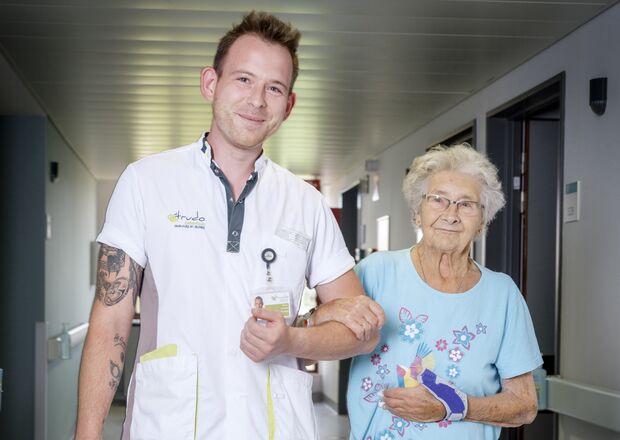Falls Clinic
About 30% of people over the age of 65 fall once a year. Due to the aging of the population, the number of fall incidents is increasing. Direct injuries from a fall include bone fractures, soft tissue injuries and cerebral disorders. In addition, there are the psychological consequences of a fall, where the fear of another fall can undermine self-reliance. Both aspects can jeopardize independent functioning in the home situation.
Plan your appointment

Een valscreening
Ongeveer 30 % van de mensen ouder dan 65 jaar valt jaarlijks eenmaal. Door de vergrijzing van de bevolking neemt het aantal valincidenten toe. Directe letsels van een val zijn botfracturen, weke delen letsels en cerebrale aandoeningen. Daarbij komen nog de psychologische gevolgen van een val, waarbij de angst voor een volgende val de zelfredzaamheid kan ondermijnen. Beide aspecten kunnen het zelfstandig functioneren in de thuissituatie in het gedrang brengen.
Er wordt voor elk ambulant contact een valscreening uitgevoerd op basis van het klinisch oordeel van de arts. Hierbij zal de arts nagaan of er bij de patiënt een valrisico aanwezig is. Ook zal de arts het valrisico beoordelen wanneer hij/zij handelingen stelt die een verhoogd valrisico met zich meebrengen (bvb. toedienen kalmerend middel zoals sedativum, gewrichtspuncties, bepaalde onderzoeken, …).
Fall screening
An assessment is performed prior to each ambulatory patient contact based on the doctor's clinical judgment. In doing so, the doctor will assess whether a risk of falling is present in the patient. The doctor will also assess the risk of falling when he performs actions that entail an increased risk of falling (e.g. administering sedatives, joint punctures, certain examinations, etc.).
Practical course of the screening
A fall screening takes place on Tuesdays and Fridays from 8:30 a.m. to 4 p.m.
The patient is screened in the geriatric day hospital by a multidisciplinary team. The following components are covered:
- A medical evaluation by the internist-geriatrician, focusing mainly on the possible cause of the fall. The following elements are important in the anamnesis:
- the history
- the circumstances of the fall
- the symptoms that preceded the fall
- the medication
- A nursing evaluation, primarily aimed at identifying risk factors in falling. The most important are:
- visual disturbances
- urinary incontinence
- orthostatic hypotension
- nutritional status
- An evaluation by the occupational therapist, focusing on risk factors related to behavior and living environment:
- activities of daily living
- cognitive disorders
- depressive symptoms
- fear of falling
- external risk factors
- An evaluation by the physiotherapist, aimed at detecting mobility and balance disorders.
- Multifactorial intervention program
- During a joint follow-up discussion, a plan of further action is made, taking into account the causes of the fall and the risk factors for a new fall.
- Sometimes further additional examination must be performed to reach a clear diagnosis. In other cases, treatment of the cause of the fall can be considered and what preventive interventions might be useful.
- The geriatrician advises the general practitioner.
- The patient is personally given some advice and tips to prevent other falls.
Information brochure
As a patient, you're entitled to quality care. It is therefore our priority to treat every patient in the best and most efficient way. In addition, we try to make your stay in the hospital as safe as possible. During a hospital stay, several factors can lead to an increased risk of falling (anesthesia, surgery, medical condition, IV lines and other medical equipment ...). Through the brochure(s) below, we would like to provide you with useful tips related to prevention in the hospital, as well as in the home situation.



